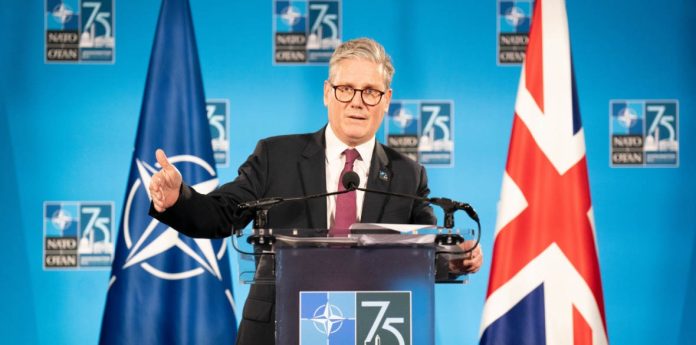By Ben Chacko
LONDON: British Prime Minister Keir Starmer could respond to a renewed Donald Trump presidency by confronting the far right in Britain and internationally. He could have used his meeting with French President Emmanuel Macron to discuss the common causes of the rise of Reform UK in Britain, National Rally in France and analogous movements across Europe.
All are emboldened by Trump’s win — and without addressing public perceptions of long-term societal decline across Europe and the US, linked to falling living standards, failing services and a feeling that today’s politics leaves us powerless playthings of corporate interests, many have the potential to take political power.
If he felt a British premier should focus not on domestic US politics but foreign policy, he could have used the summit to warn that Trump’s open support for Israeli annexation of the West Bank is unconscionable and assert Britain’s official commitment to a sovereign and independent Palestine.
He could make a dramatic statement of intent here without even directly criticising Trump, by simply restoring Labour’s previous policy — which he disgracefully dropped as Palestinians face their most severe assault since 1948 — of recognising the state of Palestine, in line with over three-quarters of all member states of the United Nations, most recently Ireland.
Nobody will be surprised that Starmer has done none of these things. Britain is complicit too in the ongoing Palestinian genocide. Labour mimic the far right in comparing the so-called threat posed by refugees to that of terrorism.
As for waking up to the threat of Reform UK, Starmer still boasts so often of having made Labour electable that he may not even have grasped the implications of the sharp fall in its vote at the last election.
It is a grim indication of the depth of the European Establishment’s commitment to war, though, that they see the most worrying aspect of a Trump presidency as the risk it might try to end the war in Ukraine.
In fact, US enthusiasm for continuing the torrent of money and weapons to Kiev has been ebbing for some time. Both US and European diplomats have been briefing for months something similar to the ideas now being aired by Trump’s advisers — that Ukraine needs to give up on the idea of achieving total victory and the eventual settlement of a war which has claimed hundreds of thousands of lives will involve concessions.
Reports from Starmer and Macron’s talks, however, suggest they see Trump’s looming presidency as an opportunity to convince Joe Biden — whose increasing mental frailty is, after all, why he dropped out of the presidential election — to throw caution to the winds and agree to let Ukraine fire long-range missiles deep into Russia.
This key aspect of Ukrainian President Volodymyr Zelensky’s “victory plan” is unlikely to make much difference on the battlefield. Like his request for fast-tracked Nato membership, it is best understood as a strategy to further entangle or directly involve Nato in the war: Russia, after all, says that these missiles cannot be targeted without the use of US systems and therefore would constitute a direct US attack on its soil.
If the aim is to so escalate the war in the next two months that Trump will find it impossible to back out, it’s an exceptionally dangerous game — one which risks its spread to neighbouring states and even into a direct Nato-Russia shooting match, which would put millions of lives in Britain and France at risk.
Like the EU’s embrace of far-right leaders who trample on refugee rights and restrict free media so long as they toe the line on Ukraine — the contrast in treatment of Italy’s Giorgia Meloni and Hungary’s Viktor Orban is instructive — it illustrates the bankruptcy of a political class desperate to uphold US imperialism at the expense of the economies, living standards and safety of their own countries. (IPA Service)


